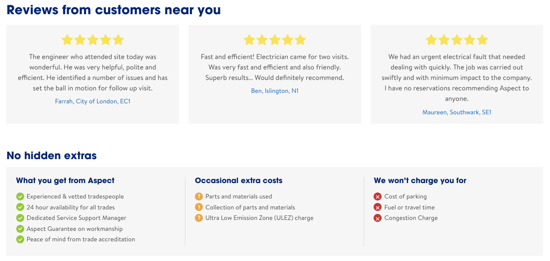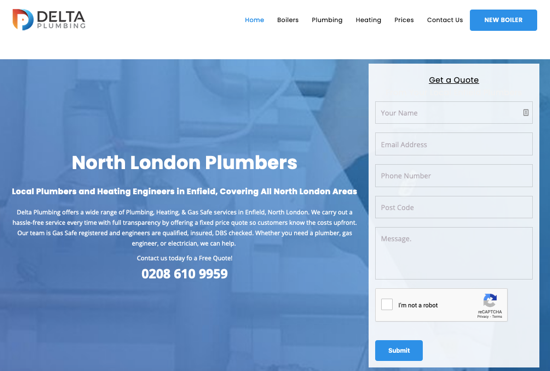Six ways a website can get you new customers
If your small business has gotten this far without a website, you might be wondering: do I really need one? Why get a website if my business is already doing well without it?
If you’re on the fence about creating a website, we’ll save you some time – you need one. Why? Because 97% of consumers go online to search for and find businesses near them. So, if they need a plumber or want to read some reviews for a local massage therapist, they turn to search search engines like Google first to find and learn more about local businesses like yours.
What does that mean for your business? It means that if you want to attract new customers beyond your personal networks or a brochure, you need to be where your potential customers are – online. And that starts with having a website.
If you’re still on the fence, here are the top six ways a website can get you in front of more customers and help you to grow your small business and revenue like never before.
1. By getting you found online
You may be happy with the current size and success of your business, but every business deals with customer turnover. What then?
You can try handing out more brochures or asking more friends and family members to recommend you to others. Or you can try a better, more profitable tactic – to make your business visible online, the first place people go to to find everything they need, from reviews for a nearby handmade candle shop to a good local electrician to directions to a specific bakery.
If you don’t have a website, how can people know your business exists since you’re nowhere to be found in the search engine results? But if you have a website, potential customers can more easily find you online, become interested in what you have to offer and want to know more. They’ll know exactly what you can offer, how much your products and services cost, and how to contact you, all thanks to the information available on your website.
Bottom line, having a website can help your business to get found online and attract a steady stream of new customers that you might not be able to attract offline.
2. By adding instant credibility to your business
Consumers these days are sceptical of businesses that don’t have a website. Consider these statistics:
- 30% of consumers won’t consider a business without a website.
- 46% say a website is the biggest determinant of whether they trust a company.
What does this mean for you? It means that if you don’t have a website, people may question your legitimacy as a business. They might wonder whether or not your business really exists and if they can trust you to show up, deliver on your promises, and provide support whenever they need it.
On the other hand, when you have a website you have the opportunity to make a very strong first impression and give people comfort that you’re a real business. So it’s not just a great way to attract new customers but also to reassure them that you are someone that they can trust to buy from.
3. By presenting your business in the best possible light
Having a website means you own a piece of the internet highway along with a huge billboard with your ad on it. Plus, you have all the space you need to present your business in the best possible light and at a relatively low-cost.
Unlike a brochure or a newspaper ad, you’re not limited by a few lines of text and an image. On your website, you can have multiple pages to talk about your business and showcase your products and services in detail using text, images, videos, infographics, downloadable PDF instructions, and more.
You can add whatever type of information you want in a variety of formats to highlight all the benefits of doing business with you and show how you can help make people’s lives easier and better.
With all these options and flexibility, you can choose how best to present your business so hesitant prospects will have no reason to go elsewhere. This isn’t something you can easily do when you don’t have a website.
4. By engaging with prospects even before they contact you
A website also gives you the perfect platform to engage and build a relationship with your prospects even before they reach out to you.
Think about it. You can publish answers to common questions that your potential customers may have about your products, services, and how you can help. You can add information about your location, contact details, and how you work. You can also add testimonials and reviews from previous customers to highlight the value you provide and the kind of experience customers can expect from you.

This kind of useful information can reassure visitors you’re the right choice and entice them to take that next step and buy from you.
5. By attracting customers 24/7
Unlike a physical store or location, your website is available 24/7/365 even when you’re not. It acts as your “always-on” salesman during and outside of office hours. This means that your website and everything on it is available to prospects anytime they’re online, and whenever it’s most convenient to them. So, whether someone visits your site at 1 am or 2 pm, you’re still interacting with them in some way and providing them with the information they’re looking for.
A website also gives visitors the option to contact you outside office hours. All you need to do is to have a contact form on your site that people can fill out and/or an email address that they can use to reach out to you. This can result in more leads and sales outside office hours, which is something you can’t achieve when your business is closed for the day.
Here’s an example of a simple contact form you can add to your website:

6. Stand out from the competition
If your competitors already have a website, you’re simply giving your customers a reason to buy from another business.
But what if your competitors don’t have an online presence? Then that’s one more reason to create your website and get it up and running. You’ll not only stand out from the crowd but prospects will also be more likely to reach out to you instead since you’re the one showing up online when they’re searching for your business.
Wrapping up
Websites have become essential to businesses today. It’s how consumers find them online and it’s also most often their first point of interaction with a business. Considering the low-cost investment and how easy it is to create a site, even if you have no technical skills, the question isn’t whether you need a website but if you can afford to not have a website.
So, if you want to continue thriving in the long term, get yours up and running as soon as possible. Read these posts to learn how to get started:
